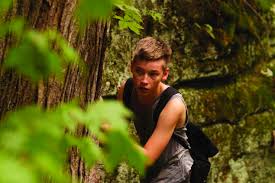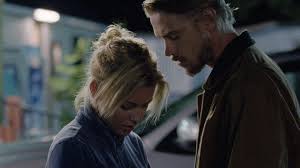Check out Little Accidents this week at a/perture. Following the 4:00 p.m. and 6:30 p.m. screenings on Saturday, February 21, producer Summer Shelton will be present to answer audience questions (see my Q & A with her below).
Little Accidents is an interesting title because some of the accidents in this coalmining town nestled in the rural mountains are not so small, including the mining accident that frames the narrative, and all of them have a ripple effect throughout the community that seems to go on and on.
First-time feature writer and director Sara Colangelo tells the type of story I have a predilection for – an intimate drama with links to larger social issues. There is a delicacy to the storytelling and a peeling away of layers of identity to reveal underlying connections among unlikely people, which creates a lot of tension, inspires empathy from the viewer, and reveals some of our most common shared experiences and greatest shared fears as human beings.
A great deal of the success of the movie rests on the casting and performances Colangelo gets from a trio of leading actors and supporting performers.
Jacob Lofland (Owen) proves that his turn in Mud was no fluke. There is never a false note in his portrayal of a teenager dealing with the loss of his father and a huge secret that gnaws at him.
Elizabeth Banks shows welcome range here in a departure from her comedic roles, and Boyd Holbrook is a compelling presence throughout. Chloë Sevigny does not have a lot of screen time as Owen’s mom, but their interactions have a detached authenticity – if their relationship were different, perhaps some of the little accidents, or at least the consequences, would have been mitigated.
Or course, then viewers would not be able to engage this particular story. This is a small film that has a big impact on the human heart.
Interview with producer Summer Shelton:
Mary: You seem to be drawn to intimate dramas, Summer. How do you select which projects you want to work on?
Summer: It’s a potpourri of ways: sometimes I start out just drawn to certain filmmakers wanting to help be a part of developing their body of work, or there may be cast or producers on board that I’d like to work with, and sometimes projects find me. With Little Accidents, it was a bit of all of the above, Sara wrote a beautiful script and her shorts films were so visionary and beautiful, and I had wanted to work with Anne Carey for a while so she brought me onto the project due to my background making regional films. I feel very lucky to be a part of Sara’s feature debut. She is very talented.
At the end of the day, though, no matter how the project starts, I am drawn to stories that either shed light on a place or community that may be overlooked with relatable “everyman/everywoman (ish)” leading characters in pursuit of a truth or overcoming an obstacle.
It is funny you point out that I’m drawn to drama; I think the material I’ve been lured to can be attributed to the talented filmmakers who have created such rich complex characters. Not too long ago, someone was pitching me an idea and started, “I have this idea for a film I’d like to make; I don’t know if you’d like it because it is a comedy,” and I actually had to interject quiet quickly and let them know that I do indeed actually like to laugh. One of my latest films People, Places, Things is a very heartfelt comedy.
I like a good story regardless of genre.
Mary: What are your strengths as a producer?
Summer: I have been fortunate to collaborate with amazing writer/directors and work on projects from development to distribution. I have a strong background in physical production so I can take an abstract idea and figure out how to make it tangible onscreen. I have learned from great mentors (Ramin Bahrani, Anne Carey, Declan Baldwin, Louise Lovegrove and through Fellowships with the Sundance Institute and Film Independent) that a film is made several times –on the page, on the set, in the edit room, in the sound mix and in front of an audience—all require a producer to understand how to preserve the vision of the film within every iteration and know how to support a director through every incarnation. I like helping people, so I wanted to learn how to make a movie soup to nuts exposing myself to both the creative and the technical side as much as possible so I can lead and support everyone throughout the process.
Mary: I know you were a teacher in North Carolina before you decided to make a career change. When did you decide the film business was for you, and what path did you take to get where you are?
Summer: I never aspired to be a filmmaker; I didn’t really know what it meant to make a career out of making movies. I thought you just had to be in them. So I start out trying to be an actress, doing some auditions, acting in a few things and in undergraduate study at Pfeiffer University, I did a lot of theater, but while there in theory classes, I became fascinated by the power of words and images. I thought I would have a career in marketing or advertising. I continued my studies in Liberal Arts at Wake Forest University where I got my Master’s as I taught high school English.
After I got all the degrees I thought I needed as a safety net, I was just at the age where I thought why not go to film school for a year and see what happens. It was a now or never type of thing. Lucky for me it was during that year of film school at UNC School of the Arts that Ramin Bahrani (Winston-Salem native) came back to make his third feature Goodbye Solo. He needed someone to help doing local casting. Making that film and working with him over the next several years was my other film school, I learned so much from him. He is so smart and generous with his knowledge. Since then, getting where I am has been just seizing every opportunity and just going for it. I feel like I have just spirited an eight-year marathon making movies all over the place. It is great to be back here with the opening of Little Accidents while also doing a guest adjunct position at UNCSA for the next few weeks. I have always loved teaching and giving back in what ways I can to help others.
Mary: This is writer-director Sara Colangelo’s first feature project. I think it’s an auspicious beginning. Do you know what she’s working on now?
Summer: Presently, Sara is working with the Sundance Institute Film Forward program, screening Little Accidents in classrooms and in smaller communities around the country that may not have access to independent film, as well as developing a television pilot, which is set in another American industrial landscape.
Note: I served on Summer’s thesis committee when she completed her graduate work Wake Forest University and am very proud of the work she has pursued since.

